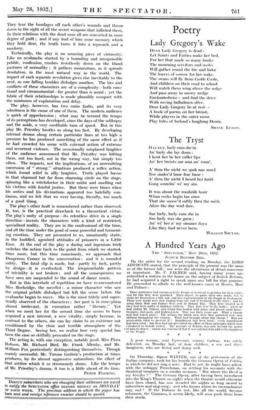A Hundred Years Ago
A poor woman, near Eyreeourt, county Galway, was safely delivered, on Monday last, of four children, a non and three daughters, who are living and doing well.
* s * *
On 'Thursday, Signor WINTER, one of the performers of the Italian company, took for his benefit the German Opera of Fidelio, in which he did not sing a note. Had he not, he might have asked, with the unhappy Frenchman, on settling his accounts with the theatrical treasurer on a similar occasion, " But whore the Devil is my benefice 7" The German Opera, after having been introduced into the King's Theatre on nights when the theatre would otherwise have been closed, has now invaded the nights no long sacred to subscribers and sing-song ; and who knows where its encroachment may end ? If the Italians do not, like all the world, become reformers, the Germans, it seems likely, will soon push them from their stools.
THE "SPECTATOR," MAY 26m, 1832. SCOTCH REFORM BILL.
On the order for the second reading, on Monday, the LORI) ADVOCATE stated, that the principle of the present was the same as of the former bill; nor were the alterations of detail numerous or important. Mr. F. PALMER said, having many years ago submitted a motion to the house on the subject of Scotch Reform, he had acquired a right to speak upon any bill for that purpose. He proceeded to allude to the well-known cases of Messrs. Muir and Palmer :
These gentlemen had encouraged the People of Scotland to petition for their right+, and for this they were punished. Their object, to quote their own words, was In Oahu for themselves a full fair, and free representation of the Pmple In Parliament. These very words were now ringing from one end of Scotland to the other ; and for using them Muir and Palmer were seat to Malloy Buy. They were treated UN If they hod peen guilty of highway robbery. They were sent to the hulks ; where he had visited Mr. Palmer, and found him loaded with irons, and placed amid home. breakers, foot-pads, and highwaymen. That was forty yearn ago. What a change had now taken place I Thr actions for which men were then punished were now idolised throughout the country. What had brought about thin change ? Had not persecution tried to prevent it ? Banishment lad been tried ; every punishment had been tried ; but they had not prevented the effect of those principles which were calculated to benefit smarty. The measure of Reform was now beyond the power • of num to stop it ; and he was convinced that It was calculated to add to the happiness of the People.
* s *








































 Previous page
Previous page